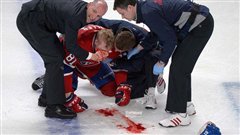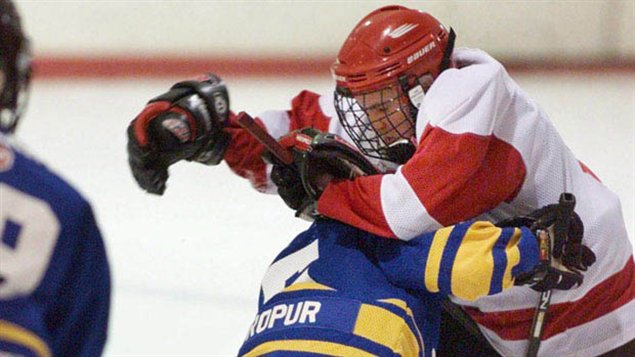Faced with mounting evidence of the damage caused by concussions, many hockey associations across Canada are now reconsidering policies in regards to bodychecking by very young players
In western Canada, Hockey Alberta, announced this week that it will ban bodychecking in PeeWee Hockey. The decision was made following a bitter debate which had earlier seen the resignation of the president of a regional organization, Hockey Calgary, after he had suggested such a ban for the 11 and 12-year old players.
Rob Litwinski, general manager for Hockey Alberta said player safety was at the root of the decision. An “overwhelming” amount of research and information supporting the risks of checking at the peewee level gave reason for the board of directors to make the policy change without any delay, adding bodychecking is the most consistent risk factor for injuries and concussions.
Debate over when to allow players to start hitting has inflamed emotions on both sides of the argument for years, but gathered steam after research came out of Alberta last year showing that there was a three-fold increase in the risk of injuries for peewee players who check in Alberta, compared to those in Quebec where bodychecking is not allowed until bantam.
The paper, which represents the Canadian Pediatric Society’s position on bodychecking, said it should be banned at all recreational levels, delayed until age 13 for elite players and not allowed at all for girls.

The provincial hockey association in east coast Nova Scotia is likely to also ban checking at the PeeWee level when it holds its annual meeting this weekend.
Halifax paediatrician Andrew Lynk is part of a group of doctors who will make the case for delaying bodychecking until players are at least 13 and possibly older. He says the brain is still undergoing tremendous change in early adolescence and kids who get concussions become more susceptible to getting others. Doctors have also said there is potential
A senior official of the national organization, Hockey Canada is also speaking at the Halifax meeting. Paul Carson, Vice President of Development says he’s concerned bodychecking has become too big a part of the game at the expense of skill development. He notes that bodychecking for very young players will also be discussed at the national level during the annual meeting in a few weeks time.
On Canada’s west coast, British Columbia will discuss a similar ban. In Canada’s biggest city, The Greater Toronto Hockey League, proposed last month to raise the age bodychecking can start to 13 from 11. It suggested it could also eventually move toward banning bodychecking in some bantam divisions, which include kids aged 13 and 14.
Still a very contentious issue, many posts on discussion forums and in tweets were against the decision saying the kids would only be more severely hurt in the next league as they had no experience in giving or taking “hits”.
Kelly McClintock, general manager of the Saskatchewan Hockey Association, also panned the decision, saying bodychecking is a skill that should be taught to kids as young as eight or nine. “Our view is, start it younger, teach it as a skill just like any other skill and there’s less likelihood of there being any injuries,” he said from Regina







For reasons beyond our control, and for an undetermined period of time, our comment section is now closed. However, our social networks remain open to your contributions.